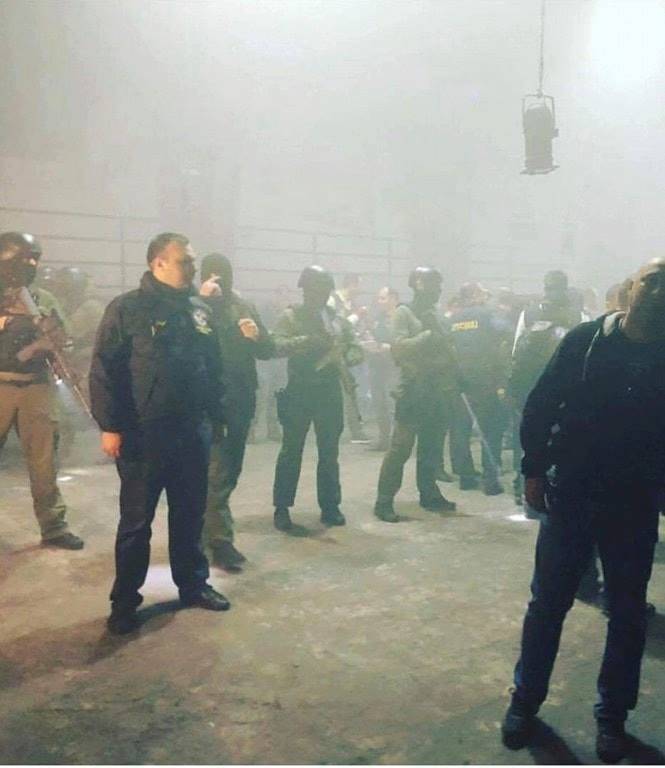საერთო ცხელი ხაზი +995 577 07 05 63


Photo: Ipress.ge
The undersigned organizations respond to and express our concern over the unprecedentedly extensive special police operations conducted simultaneously in several nigh-clubs in Tbilisi on the night of May 12 and subsequent arbitrary arrests of participants of spontaneous gatherings in the streets of Tbilisi, as well as acts of interference with the freedom of assembly and degrading treatment.
It has been reported that on 10 May 2018, the Ministry of Internal Affairs obtained a court warrant for searching premises of several nightclubs in Tbilisi. It then conducted search operations using massive police force late at night on May 12, when hundreds of people were gathered in the nightclubs. We have learned that as the special operations began and the police started getting people out of the nightclubs, some were subjected to degrading treatment while nightclub owners and administration were not allowed to attend the entire search process.
A group of young people that had been forced out of the club and others disgruntled with the large-scale special operations staged a spontaneous rally outside Bassiani nightclub. Despite their large numbers, participants of the rally were not allowed to stand on a carriageway. Instead, the police was using cordons and aggressive behavior to limit protesters to sidewalks with clearly insufficient capacity. Eventually, after engaging in episodic and aggressive actions, using disproportionate force against some individuals and arresting several assembly leaders, the police managed to isolate groups of assembly participants, disband them into the streets and clear the territory of the assembly with a massive cordon. It should be noted that overall the assembly progressed peacefully and within the limits of the law, and in most cases, it was the police who created arbitrary incidents of arrest and escalation.
As the assembly outside Bassiani nightclub was factually disbanded, participants of the spontaneous rally relocated themselves to the territory outside the parliamentary building where the police attempted to create the environment of fear and vulnerability by demonstrating their force. In some cases, several individuals were placed under arbitrary arrest.
Possible leaders of the spontaneous assembly were also detained as the rallies progressed, which in consideration of general approach used by the police during the assembly was indicative of the interest to counter the protest and weaken the self-organization.
We have learned that following the special operations late last night about 40 individuals have been placed under administrative detention. Some of them sustained physical injuries in the process of detention. In the beginning, it was difficult for us to determine whereabouts of the detainees and ensure that attorneys communicated with them in a timely manner. Those placed in pre-trial detention isolators have not been subjected to any type of violence or illegality.
Clearly, the undersigned organizations realize the importance of combating the illicit drug trade and respective obligations of the state. The process should start by identifying influential criminal networks and taking strict measures against them. At the same time, it is important to make substantial changes in the drug policy of the government to allow it to focus on care and social rehabilitation instead of inhumane and punitive measures. Unfortunately, the reform announced in this regard has been suspended by the ruling political group and limited to the area of police repression and crime.
Managing assemblies in abidance by the human rights standards is a serious challenge for the Interior Ministry, however, police operations conducted in the streets of Tbilisi on May 12 was a clear and recently unparalleled demonstration of aggression by the government’s repressive machinery. The police conducted “micro special operations” to arrest peaceful citizens outside the nightclubs and the parliamentary building, mostly targeting political/civil rights activists.
Later the Interior Ministry reported that within the investigative measures 8 individuals had been arrested on criminal charges. However, later we found out that these arrests were not made within the special operations but rather, earlier in a different situation and outside of nightclub premises. Under these circumstances, the need to conduct special operations with such form and extent and the validity of the special operations are called into question. The validity of the search warrant is also questionable since it carried high risks associated with general non-individualized search and restriction of rights of a wide group of individuals.
In light of the foregoing, the undersigned organizations urge the state to:
The undersigned organizations stand ready to provide legal assistance to victims of human rights violations. We also urge individual citizens to share with us any information about incidents of human rights abuse, as it will help us evaluate and respond to the situation effectively.
Human Rights Education and Monitoring Center (EMC)
Article 42 of the Constitution
Transparency International Georgia (TI)
International Society for Fair Elections and Democracy (ISFED)
Human Rights House
Open Society Georgia Foundation (OSGF)
Georgian Democratic Initiative (GDI)
Georgian Young Lawyers’ Association (GYLA)
Institute for Development of Freedom of Information (IDFI)
Partnership for Human Rights (PHR)
Women's Initiatives Supporting Group (WISG)
Georgia's Reforms Associates (GRASS)
Equality Movement
Media Development Foundation (MDF)
Tolerance and Diversity Institute (TDI)
Temida
The website accessibility instruction